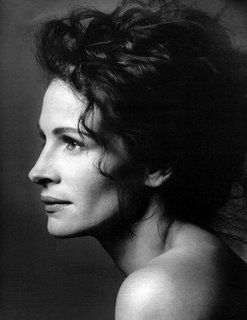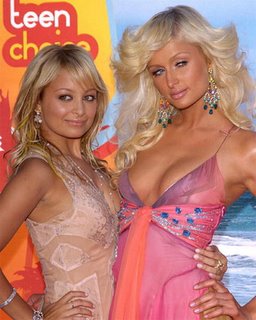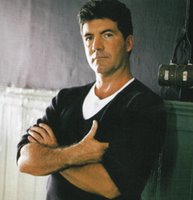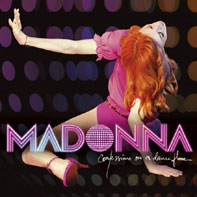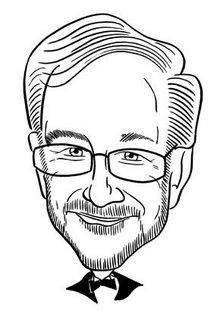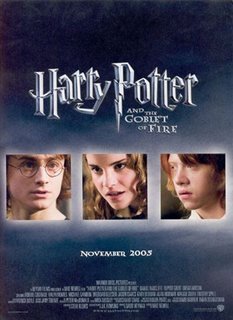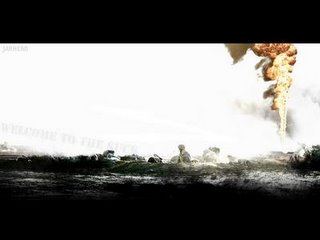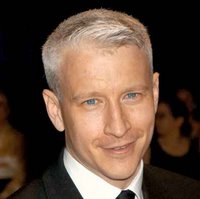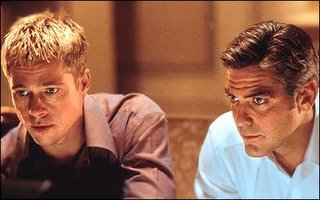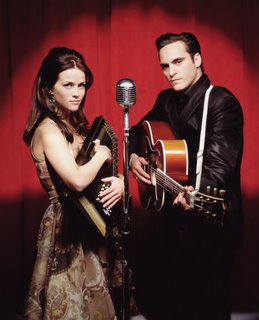
In director
James Mangold's Walk the Line, opening Friday,
Joaquin Phoenix, plays
Johnny Cash, a man whose face, style and voice is familiar even to those with an aversion to country music. The film focuses on the tumultuous relationship between Cash and his wife,
June Carter, played by
Reese Witherspoon.
Though Phoenix nabbed the part that many actors coveted, he admits to being a "little panicked" when he was told he had won the job. "I thought, 'Oh, this is great ... oh, I don't know if I can do this,'" Phoenix said during an interview at this year's Toronto International Film Festival. "The truth is, I was an admirer of Johnny Cash the man, but I really wasn't familiar with his work. I knew
'Folsom Prison Blues,' of course, but everything that came before and after was a little hazy."
Phoenix first talked to Mangold, director of the gritty thriller
Copland, around the time he was getting his first mass exposure in his supporting role in
Gladiator. "My girlfriend of the time,
Liv Tyler, knew Jim and had told him she thought I might be right for the part, I'm not exactly sure why. Anyway, we had a good talk, but I told him upfront I wasn't a musician or a singer. At that time, it hadn't been decided if we would actually perform the music or use Johnny's original recordings.
"Still, the first thing I did was go out and buy a guitar and just learn how to hold it, you know? I got a book and taught myself a few chords. But I didn't do any research really, because I thought if I did, I'd jinx it. So when the film finally did get a green light, I had some cramming to do."
Reactions to
Walk the Line following its Toronto premiere were mixed, but one thing nearly everyone agreed on was the strength of the performances by Phoenix and Witherspoon and the chemistry between them. Both actors are already on just about every observer's short list for Oscar nominations.
"I don't know that I could have done this without Reese," says Phoenix. "We have very different acting styles, but she had enough faith in our compatibility for the both of us. She's the one who got me a singing coach and hooked me up with T-Bone (Burnett, the producer and guitarist), who was really encouraging.
"But I think the first time I felt like it was going to be OK was when Johnny's son John R. came to a rehearsal," he says. The younger Cash was a consultant on the film. "He said, 'You know, you hold that guitar just like Daddy did.' That was enough to keep me going."
Weight of reality Witherspoon was also intimidated by playing someone so well-known. She grew up in Nashville, where, she says, "country music was everywhere. The voice of Johnny Cash was everywhere."
"I had never played any real-life characters in any of my films, and I realized pretty quickly there was a responsibility attached. You want to be true to who these people were, but you also have to have their trust. Remember, John and June were both still alive when James started working on this almost 10 years ago, and they were very concerned about how they would be portrayed."
Though both Cash and Carter had written and talked extensively about their relationship -- which began when June was still performing as a member of the legendary Carter Family singing group and Cash was an up-and-coming young country star appearing at the Grand Ole Opry -- they had always said their relationship was never physical while both were married to other people.
"Nobody really believed that, but these were Christian people with families who grew up in a time and place where adultery was considered a truly sinful act, not some sort of casual thing that was easily forgotten or forgiven," says Witherspoon. "They may have been in show business, but they weren't Hollywood celebrities. They had a different code of conduct, and it was hard for them.
"Finally, Jim just told them he couldn't make the movie and make it convincing if he tried to maintain that fiction, because the truth was, what they had done weighed heavily on them; it affected how they lived. Ultimately, they said OK, but it was hard for them."
Witherspoon said the idea of doing the actual performing in the film initially "scared me to death. The only public singing I had ever done was as a kid, in plays, that sort of thing."
But it was eventually decided that unlike "Ray," the Ray Charles biography with which "Walk the Line" is destined to be endlessly compared, the actors would do their own singing. Witherspoon also learned to play autoharp, the multi-stringed Appalachian instrument that June played with the Carter Family.
"I actually had it easier than Joaquin because while June had a beautiful voice, the focus was never on that in the early years; her sisters were always considered the real singers. She mostly contributed harmonies. And, of course, she had carved out her niche as the comedian in the act. So except for her true fans, most people know singing mostly through her duets with John."
It was decided that Phoenix would try to find the essence of Cash's distinctive baritone and not attempt an imitation.
"I wanted this to be authentic as possible, but I also wanted to play the people, not the images," says director Mangold. "The Johnny and June you see in this movie are the people outsiders never saw."
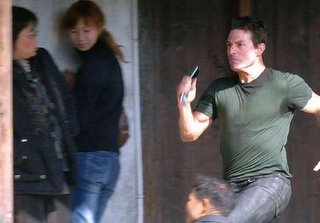 Tom Cruise wrapped filming of Mission: Impossible III today in China. Cruise and the film’s director, J.J. Abrams held a press conference for journalists atop the historic Bund 18 building after wrapping up scenes for the new "Mission: Impossible" film, due in theaters next year.
Tom Cruise wrapped filming of Mission: Impossible III today in China. Cruise and the film’s director, J.J. Abrams held a press conference for journalists atop the historic Bund 18 building after wrapping up scenes for the new "Mission: Impossible" film, due in theaters next year.